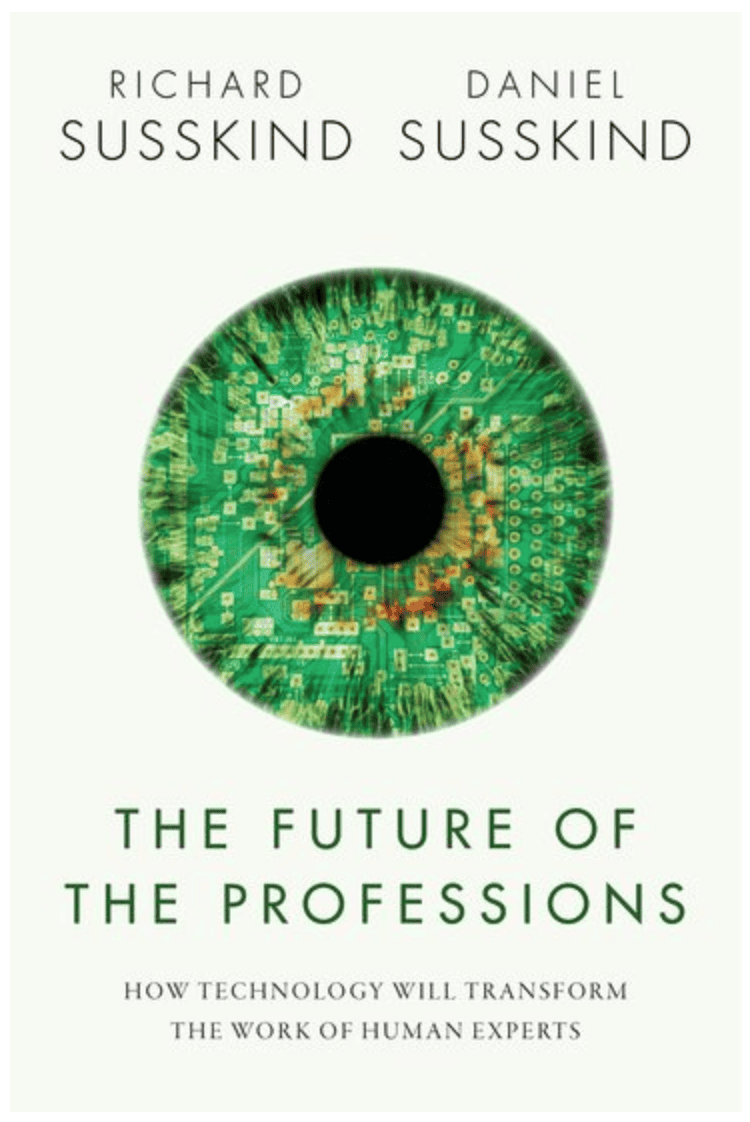Management guru Peter Drucker famously stated that “the only thing we can predict about the future is that it will be different.” And where the professions are concerned, the future looks to be very different, indeed.
So say the father-and-son team of Richard and Daniel Susskind, whose magisterial book, The Future of the Professions, presents a deep analysis of the forces now driving fundamental change across all professions, including (and perhaps especially) law.
If the Susskinds are correct, the entire social rationale for the professions’ existence is disappearing – and their role as stewards of the world’s expert knowledge will inevitably be superseded.
Few authors are more qualified to make these types of predictions. Professor Richard Susskind is one of the world’s foremost authorities on technology and the legal profession. As far back as 1988 he co-developed he world’s first expert system in law. Since then he has advised governments and international professional services firms, and authored best-selling books on the future of law, including Tomorrow’s Lawyers (2013). His son Daniel, currently a lecturer in Economics at Balliol College, Oxford has served as a cabinet-level Policy Advisor on strategy to the UK government.
Today, many commentators are writing about the future of technology (particularly artificial intelligence) in the law profession. While the Susskinds recognize the importance of AI, their analysis goes far deeper, exposing structural threats to the existence of the professions themselves.
The book begins with a history lesson. The authors describe the “Grand Bargain” under which the professions – including medicine, accounting engineering, architecture, divinity, journalism, education, consulting, and law – became the gatekeepers of specialized knowledge in modern society. As the scope and complexity of the world’s knowledge grew, it become impossible for the average person to solve complex problems on their own. Specialized knowledge domains emerged, and the practitioners of those domains (starting with the medieval guilds) received payment and recognition for their knowledge.
Over time, in return for maintaining and disseminating their knowledge, society granted these practitioners more and more power over their domains – including self regulation, autonomy and licensing (i.e., control over who could join their ranks). The practitioners became the professionals – and gained outsized influence, monetary rewards and prestige in society as a whole.
This worked to everyone’s benefit for a long time. But today, argue the authors, the Grand Bargain no longer meets society’s needs for specialized knowledge. Deep expertise in all fields is more essential and in greater demand than ever – but, as delivered by the professions, it is nowhere near as accessible or affordable as was originally intended. Different ways of delivering knowledge are needed – solutions that are more transparent, less expensive and less forbidding than the traditional professional-to-client relationship.
The Susskinds describe some of the alternative solutions that are emerging across all professional groups. For law, they refer to new competition in the firm of alternative, lower-cost business structures, and new divisions of labour (whereby lawyers find alternative and cheaper ways of sourcing routine work). They also cite the levelling influence of technology, in the form of expert systems, online databases, Big Data algorithms, document assembly systems, Online Dispute Resolution, and automated legal compliance tools.
Despite these many emerging options, say the authors, the professions have a vested interest in the status quo, and little incentive to change. They have been successful in “mystifying” the details of their work, thereby maintaining exclusivity and social prestige. But today, as professional work is decomposed into more basic tasks and performed by technology or non-specialists, it is becoming de-mystified. Professionals no longer receive the veneration and respect that used to be their due, nor can they command the premium rates on their services that they have come to expect.
What we now are seeing, according to the Susskinds, is a rapid fragmentation of the way specialized knowledge is produced and delivered. The traditional model of the professions – human experts charging for face-to face interactions on the basis of time spent – is only one approach, and an outdated one at that. The authors describe six others:
- Networked experts model
- Paraprofessionals model
- Knowledge engineering model
- Communities of experience model
- Embedded knowledge model
- Machine generated model
Projecting these models into the future, the authors foresee a post-professional world where more and more expert services are collated, delivered and shared by “increasingly capable, non-thinking machines,” with greatly reduced need for the gatekeeping roles played by the professions today. Society will benefit from wider, more economical access to knowledge. The professions themselves will experience “technological unemployment” – over time, there will not be enough need for human-generated expertise to maintain today’s armies of professionals. The transformation will not happen overnight – but happen it will.
This vision is controversial, and the Susskinds devote an entire chapter to addressing the objections and anxieties raised by the concept of a post-professional world. They cite arguments in favor of the trust, reliability and ethics provided by the professionals, concerns about the amorality of markets, and the loss of the empathy inherent in professional-to-client interactions.
Perhaps most importantly, they acknowledge and deconstruct the argument that the decline of the professions will harm society by eroding the “good work” available in the economy. While the need for traditional professionals is likely to disappear, the Susskinds outline twelve future knowledge-based roles that will be required and valued in a post-professional society – from craftsperson to data scientist and knowledge engineer.
This review provides only a sample of the insights and “A-ha moments” contained in The Future of the Professions. The book is not an easy read – its language is academic and dense; its scope is vast. But the slog is worth it for any person with an interest in today’s professions and where they may be headed. The authors’ conclusions are challenging. You may not agree with them – but they will certainly make you think long after you put the book down.
See the authors discuss their book here.






